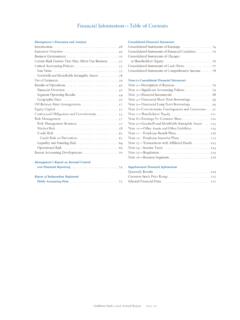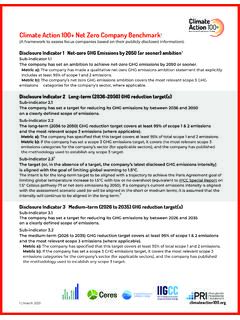Transcription of Global Macro Research TOP INVESTING IN MIND
1 INVESTING IN climate CHANGE 104 | December 13, 2021| 4:00 PM ESTfi O Global Macro ResearchInvestors should consider this report as only a single factor in making their investment decision. For Reg AC certification and other important disclosures, see the Disclosure Appendix, or go to Goldman Sachs Group, mixed progress on Global climate action at COP26, a key takeaway emerged: the private sector is stepping up to tackle climate change. But what role should it play? How effective are current investor strategies? And how do these strategies square with asset managers fiduciary responsibility? For answers, we turn to UN Special Envoy for climate action , Mark Carney, Engine No.
2 1 s Chris James, BlackRock s Evy Hambro, PFA s Kasper Lorenzen and GS analysts. Carney believes the private sector has a critical role in providing capital for the green transition, and James and Hambro argue that market-based incentives will be sufficient to align this capital with climate goals. Neither sees a conflict between fiduciary duty and climate considerations. But Carney also sees a role for policy to create investment incentives, and GS s Jeff Currie goes further, arguing that Global , coordinated policies are needed to avoid significant capital misallocation in the pursuit of climate goals, with local policies and ESG INVESTING suboptimal solutions for tackling climate change.
3 To oversimplify somewhat, the private sector will need to provide the capital investments required to execute the transition, and governments will need to provide the fiscal support to smooth the transition. - Mark Carney INTERVIEWS WITH: Mark Carney, UN Special Envoy for climate action and Co-Chair of the Glasgow Financial Alliance for net zero (GFANZ) Chris James, Founder and Executive Chairman, Engine No. 1 Evy Hambro, Global Head of Thematic and Sector INVESTING , BlackRock Kasper Lorenzen, Group Chief Investment Officer, PFA THE RISE OF TWO-SPEED DE-CARBONIZATION Michele Della Vigna, GS Energy Industry Research ESG FAILS AS A CARBON TAX SUBSTITUTE Jeff Currie, GS Commodities Research Q&A ON CARBON MARKETS Patrick Street, GS EMEA FICC Sales OPTIMIZING THE climate CHANGE SOLUTION Damien Courvalin, GS Commodities Research GREEN CAPEX: WHERE, AND HOW, FROM HERE Brian Singer, GS SUSTAIN WHAT S INSIDEofAllison Nathan |.
4 AND MOREF iduciary responsibility and climate considerations are inextricably linked; in order to properly look after clients' capital, asset managers have to invest through a lens that factors in climate risks. - Evy HambroTOP MINDJ enny Grimberg | Gabriel Lipton Galbraith | What s good for stakeholders is ultimately good for shareholders. The only difference between shareholder primacy and stakeholder capitalism is duration. - Chris JamesIn the absence of policy creating the Global carbon market required for the effective comparison of investments, investors will structurally misallocate capital. - Jeff CurrieNote: The following is a redacted version of the original report published December 13, 2021 [30 pgs].
5 8016024032040048056002468101214010203040 5060708090100 Feb-20 Aug-20 Feb-21 Aug-21 Feb-22 Effective Lockdown Index (left)Daily Change in Fatalities per Million (right outer)Daily Population Hospitalized per Million (right inner) Excl. Special FactorsGo To Travel CampaignTax Hike + Free EducationEnergyMobile Phone Charge ReductionCore CPIGS forecast405060708090 Jan-20 Sep-20 May-21 Jan-22 Sep-22 ActualGS BaselineGS Downside1st wave2nd wave3rd wave4th wave012345672016201720182019202020212022 CEEMEAL atin AmericaEM AsiaEl Goldman Sachs Global Investment Research 3 Top of Mind Issue 104 Despite mixed progress on Global climate action at the recent 26th United Nations climate Change Conference (COP26) in Glasgow, a key takeaway emerged: the private sector is now stepping up to tackle climate change.
6 But what role should the private sector, and ESG investors in particular, be playing? How effective are current investor strategies in moving the needle on climate goals? And how do these strategies square with asset managers fiduciary responsibility? As shareholders, customers and the world continue to focus on climate change, the answers to these questions are Top of Mind. To start to answer them, we speak with Mark Carney, UN Special Envoy for climate action and the Co-Chair of the Glasgow Financial Alliance for net zero (GFANZ), as well as three investors with distinct perspectives on climate INVESTING : Chris James, Founder and Executive Chairman of Engine No.
7 1, which led a successful proxy fight to put climate -minded individuals on ExxonMobil s board, Evy Hambro, Global Head of Thematic and Sector INVESTING at BlackRock, and Kasper Lorenzen, Group CIO at Danish pension fund PFA. Carney argues that the private sector and financial institutions in particular have a critical role to play in providing the capital necessary to achieve the green transition which will require a total of ~$4tn per annum through 2050. And he believes that this capital is available given the $130tn worth of assets on the balance sheets of financial institutions committed to reducing emissions via GFANZ. James and Hambro then make the case that market-based incentives will direct this capital to align with climate goals.
8 Specifically, James believes that the value creation (and avoidance of value destruction) of aligning company strategies with consumer preferences which are increasingly shifting towards climate -friendly products and services will be sufficient to motivate companies to pursue climate -minded strategies. Hambro generally agrees, arguing that the market will naturally move to sources of value creation and returns, including the green transition, and he sees an important role for both active and index funds in enabling investors to tap into this value. The power of the private sector in the green transition, Hambro says, is already evident with investors rewarding renewable power companies while sending thermal coal companies into bankruptcy.
9 Brian Singer of GS SUSTAIN also notes that investors have rewarded companies invested in the green transition that deliver favorable corporate returns. And Michele Della Vigna, author of the GS Carbonomics series, finds that capital markets deep engagement in sustainability is driving de-carbonization through a divergence in the cost of capital between high and low carbon investments. Accordingly, Hambro, Lorenzen and James don t see a conflict between asset managers fiduciary responsibility and INVESTING with a climate mindset. Hambro argues that while fiduciary duty must be of paramount importance for any asset manager, the risk that climate change poses to portfolios has inextricably linked fiduciary duty and climate considerations.
10 And Lorenzen explains that while reduced policy risk and technological advancement have lowered hurdle rates for climate -related investments, he doesn t see a conflict between returns and environmental goals in general. James also doesn t believe there s a conflict, arguing that while conflicts may arise over short horizons, what s good for stakeholders is good for shareholders over longer horizons because the performance of a company will ultimately be driven by how well and quickly it mitigates its negative impacts. While investors are choosing different strategies to facilitate the green transition, Hambro, James and Lorenzen all see value in engaging with companies on their climate goals.









